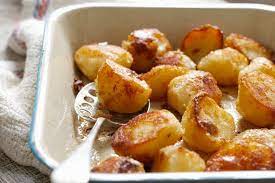French fries and mashed potatoes are the most popular, but traditional roasted potatoes offer a simple pleasure all their own. They are crisp on the outside but creamy and fluffy inside when done right. How can you ensure a flawless roast spud?
We put seven of the most popular methods to the test with this goal in mind. Many of these methods are variations of traditional potato roasting techniques. However, one contains a surprising ingredient, and many others add an extra step to ensure a perfectly roasted potato. Check out the results of this carby contest. You can do a few things to make your roasting experience more enjoyable.
A few notes about methodology
Potatoes
We used Yukon Gold potatoes for these tests. They have golden yellow flesh with a buttery, rich flavour. Although they are versatile and all-purpose potatoes, Yukon Golds are especially well-suited for roasting. We left their skins on and scrubbed the potatoes. To ensure consistent cooking, we cut the potatoes into 2-inch pieces. This is usually done by quartering a Yukon gold medium potato.
While some methods may suggest additional seasoning, we chose to use only olive oil kosher salt for comparison purposes.
All tests: All the tests were done on the same day and back-to-back using the same oven, stove, baking sheet, and other basic equipment. Each method was taste-tested immediately after it had been roasted.
Timing – Each method has its prep times, including boiling and soaking.
Ratings We wanted to find a way to produce crispy, golden-brown exteriors and fluffy interiors with rich potato flavours. Also, we consider ease of preparation and appearance in our final ratings.
Potato Roasting Method: Steam First
- Prep Time: 20 Minutes
- Cooking Time: 45 Minutes
- Rating: 3/10
This Bon Appetit method promises “perfectly-roasted potatoes” using this two-step approach. The potatoes should be steamed first. After the potatoes have been steamed to tenderness, they are removed from the oven to cool down slightly. The potatoes are then tossed in oil and salt and then roasted on a baking sheet on the lowest rack of an oven at 500 degrees F for 20-25 minutes.
Results
The main difference between this recipe and other roasted potato recipes is that it uses steaming instead of parboiling. Although it seems like a good idea, we found the process complicated and dangerous. We also found the results disappointing. To test the doneness of the potatoes after they have been steamed, you need to poke through the foil and “feel” the potatoes. Next, pour hot water onto the baking sheet. These steps are difficult and fussy without burning your face or getting a lot of steam. While the roasting process should take between 20 and 25 minutes, our potatoes turned black in the middle after only 20 minutes. This is likely because the oven was too hot, the rack too low, and the potatoes weren’t tossed or turned. Although this method is well-reviewed online, we wouldn’t use it again.
Potato Roasting Method: Soak First
- Prep Time: 35 Minutes
- Cooking Time: 45 Minutes
- Rating: 5/10
More information about this method: The potato roasting technique, popularized by The Pasta Queen from TikTok fame, involves soaking the potatoes in water for at least 30 minutes to soften them. To prevent them from sticking to the pan, The Pasta Queen recommends heating it. We used olive oil and salt as our flavouring, although she also gave some tips on flavouring potatoes. Finally, the potatoes should be roasted for 45 minutes in a 350F oven.
Results
Although this method requires very few extra steps (soaking and preheating require almost no extra effort), the results were not impressive. Despite Pasta Queen’s insistence, the potatoes didn’t stick very well to the pan in our tests. The potatoes were crisp and tasty but not as good as simpler recipes that require roasting. The skins of the potatoes were also pulled from the flesh during roasting. This is not a problem, but it was less appealing than other methods.
Potato Roasting Method: Use a Fork to Scuff
- Prep Time: 10 Minutes
- Cooking Time: 40 to45 minutes
- Rating: 6/10
This method: Although we first read about it on Lifehacker, this technique is actually from the Two Pot Chef in Australia. The One Pot Chef scuffs the potatoes with a fork before roasting. The One Pot Chef also covers his baking sheet in foil. This foil reflects heat, helps crisp and cook the potatoes, and reduces cleanup.
Results
Scuffing potatoes takes seconds. However, these potatoes did not turn out crispier than the non-scuffed potatoes that were roasted in the same way. These potatoes were the most flavorful, possibly because they had rough edges that gave oil and salt something to stick to. All those fork lines make the potatoes look a little odd, but we prefer the rustic simplicity and classic roasted potatoes. While foil makes cleanup easy, it ensures that the potatoes are more brown than golden when they come out of the oven.
Method of Potato Roasting: Toss with oil
- Prep Time: 5 Minutes
- Cooking Time: 55-60 minutes
- Rating: 7/10
This method: Molly Stevens is a Fine Cooking author and expert in roasting. This method is the easiest. It requires a 375F oven and an unlined baking pan. Stevens calls for waxy potatoes. We used all-purpose Yukon Golds to maintain consistency. Stevens suggests that you use olive oil instead of butter or oil. We did not include fresh herbs and pepper.
Results
This super-simple method created crispy potatoes. However, it is not as crisp as other methods. Although we used Yukon Golds and olive oil, these potatoes held up well. Thanks to the generous amount of oil, they were well-seasoned and evenly golden due to regular tossing. Even though it wasn’t the best, this was a good option, but we’ll be using it again.
Potato Roasting Method: Cook on Parchment Paper
- Prep Time: 5 Minutes
- Cooking Time: 40 to45 minutes
- Rating: 8/10
This method is simple and widely used in many cookbooks and websites. We used a Cookie and Kate version for this test. It calls for a 425degF oven and minimal olive oil. The potatoes should be stirred halfway through the 40 to 45-minute roasting. Cookie and Kate suggested additional seasoning, but we used olive oil and kosher sea salt to maintain consistency.
Results
Sometimes simplicity is the best. This method was simple and yielded delicious roasted potatoes we would be happy to eat. Although they weren’t as crispy as other recipes, they were still crisp with soft and fluffy interiors and perfectly golden. These potatoes were not as richly flavorful as other potato recipes, possibly because they are made with less oil. You can always increase the oil to enhance the flavour.
Potato Roasting Method: Parboil and Rough Up
- Prep Time: 15 Minutes
- Cooking Time: 35-40 minutes
- Rating: 9/10
This method: The most popular technique in English kitchens is to boil potatoes, then roughen them up before roasting. The roughing gives the potatoes a crisp texture, and the parboil helps you get started on the cooking process. There are many ways to cook potatoes, and you can find them in cookbooks or online. We used Kitchn’s Extra Crispy Roasted Potatoes recipe. After briefly boiling the potatoes, transfer them to a bowl. Cover the bowl with a plate and shake it to roughen up the edges and sides. The potatoes can be cooked in a 350F oven for 35-40 minutes with occasional flipping.
Results
The roughing-up phase was awkward and messy. Next time we might skip the plate and use aggressive tossing in the bowl. This extremely reliable, no-nonsense method produces the perfect crispy, crunchy, yet soft, fluffy potato.
Potato Roasting Method: Baked Soda, Parboil, & Rough up
- Prep Time: 15 Minutes
- Cooking Time: 55-60 minutes
- Rating: 10/10
This method: Serious Eats twist the traditional parboil/roast technique. It includes many game-changing tweaks. Baking soda is used to alkalize the boiling water. This helps to break down the potato’s exterior and makes them crispier. Instead of starting with cold water to cook the potatoes, you add them to boiling water, further reducing their size. Although the recipe calls for adding olive oil, duck fat or beef fat to the potatoes, we used plain olive oil and kosher seasonings. The oil and seasonings are mixed with the potatoes, and then the mixture is tossed for forming a thick paste. The potatoes are then baked at 450°F for 50-60 minutes, occasionally stirring and turning.
Results
We love this method because it takes a tried and true approach and makes small adjustments that result in big results. The potatoes will be super crispy when you boil them in boiling water. Once they are done, bake them in the oven until they are tender inside. It took us 45 to 50 minutes to get richly browned potatoes. So, be careful while your potatoes are in the oven. This method is a little more laborious, but it will result in some of the most delicious spuds you have ever had.






More Stories
Chocolate self saucing pudding
Chicken patties recipe
Can you eat a raw potato